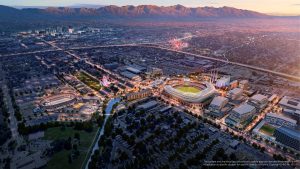Utah lawmakers have wholeheartedly thrown their support behind efforts to bring a Major League Baseball team to Salt Lake City.
The House passed a resolution 68-2 on Wednesday recognizing Utah as an “amazing” state for sports and an “ideal” geographic destination for baseball expansion. SCR3, which passed in the Senate 26-3 last week, has now cleared both legislative chambers.
“The state of Utah is also poised to host a major league baseball team because Utah has a strong base of sports fans with the Utah Jazz and the Real Salt Lake, which could indicate people will be highly receptive to the arrival of a new professional sports team,” said Rep. Sandra Hollins, D-Salt Lake City, the resolution’s House sponsor.
“Utah is also the crossroads to the West, the best spot for an expansion team.”
The Larry H. Miller Company is heading an effort to land an expansion franchise for the city. Big League Utah, a group of prominent business leaders, politicians and former professional athletes, is backing the endeavor. It has identified a site for a stadium in the Power District on the west side of the city, an area Hollins represents.
Miller Company board vice chair Greg Miller, CEO Steve Starks, retired Atlanta Braves star Dale Murphy and other company executives were on the House floor for the vote.
“My district is a jewel spot,” Hollins said, noting its proximity to public transit, highways, the airport and downtown Salt Lake City. “The community is poised for redevelopment and economic opportunities.”
The proposed 100-acre stadium site on North Temple is near the Fairpark neighborhood, which has struggled economically but has started to undergo somewhat of a transformation. Lawmakers and community members say a ballpark could be a catalyst for further revitalization.
Construction of a big league stadium, which would be part of a larger mixed-use sports and entertainment development, could cost upwards of $1 billion. Gov. Spencer Cox and legislative leaders don’t favor the use of tax dollars to finance a stadium.
Lawmakers have said they hope the resolution, which doesn’t allocate any money, conveys that there is bipartisan support to bring a big league franchise to Utah. They have talked about a public-private partnership to fund the stadium, though not exactly how that might be structured.
“We’re looking at different models around the country for how stadiums are financed,” Sen. Lincoln Fillmore, the Senate sponsor of the resolution, said last week. “We found some very good models that protect taxpayers to make sure that we’re not putting taxpayer money at risk.”
One common method of funding construction projects is to use tax increment financing, where a public entity loans money that is paid off by the extra property tax revenue the project generates after completion. It generally does not require a tax increase. Some have talked about setting up a ballpark authority, with its own board, to govern how tax money is used.
The resolution, with references to the iconic baseball movies “Field of Dreams” and “The Sandlot,” recognizes that Utah is one of the fastest-growing states and has the “strongest economy” in the country. It highlights the state’s many tourist attractions, ability to host worldwide events such as the 2002 Olympics and Paralympic Winter Games and the success of the Utah Jazz and Real Salt Lake. It also touts Utah’s long tradition of minor league baseball dating back to the early 1900s, with teams using several names, including Elders, Bees, Giants, Angels, Occidentals, Gulls, Trappers, Buzz and Stingers.
In the resolution, lawmakers say the big league club would be an economic and cultural boon to Salt Lake City and the entire state. Seeing the plan through would increase revenue and state funds for public education and other programs.
In voting for the resolution, Rep. Brian King, D-Salt Lake City, noting he has been a St. Louis Cardinals fan since serving a Latter-day Saint mission in Missouri, said, “I am looking to displace that allegiance with a team from Utah.”
Salt Lake City is competing against several other cities, including Nashville, Portland and Montreal, for what would likely be two expansion teams. MLB has not given a timeline for considering adding clubs to the 30-team league.
In the meantime, the Miller Company made a pitch for the Oakland A’s to make Utah their interim home when their lease expires at the Oakland Coliseum after the 2024 season. The team plans to move to Las Vegas but a yet-to-built stadium isn’t scheduled to open there until 2028.
Big League Utah recently paid for seven billboards in the Salt Lake area saying, “Utah Wants the A’s.”
ESPN recently reported that Salt Lake City and Sacramento, home of the San Francisco Giants Triple A affiliate, top the list of potential temporary sites for the A’s, citing unidentified sources. The Miller Company is building a new Triple A stadium in South Jordan for the Salt Lake Bees, which will leave Smith’s Ballpark in Salt Lake City after the 2024 season.
Check out the article by Dennis Romboy on Deseret News

